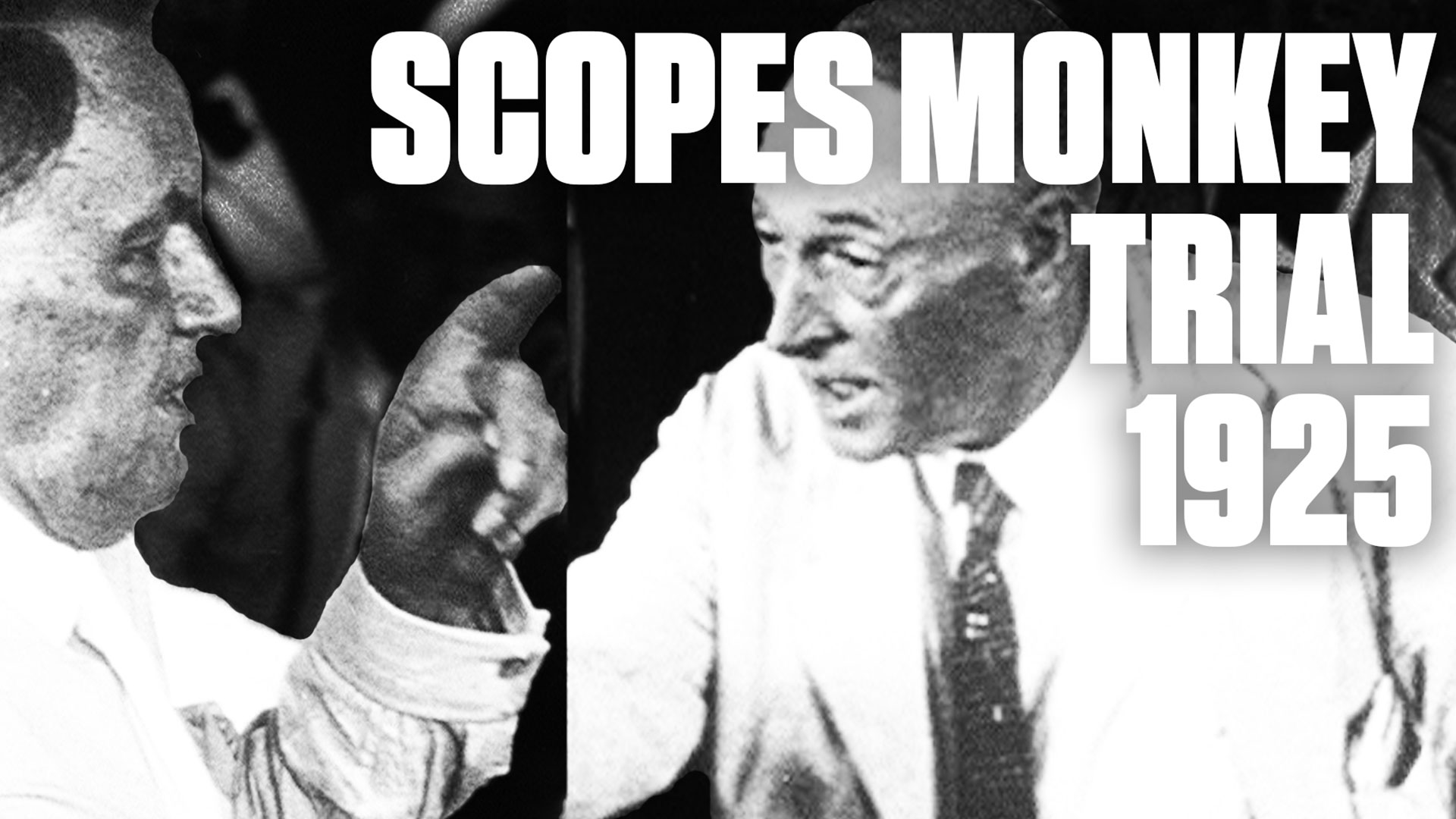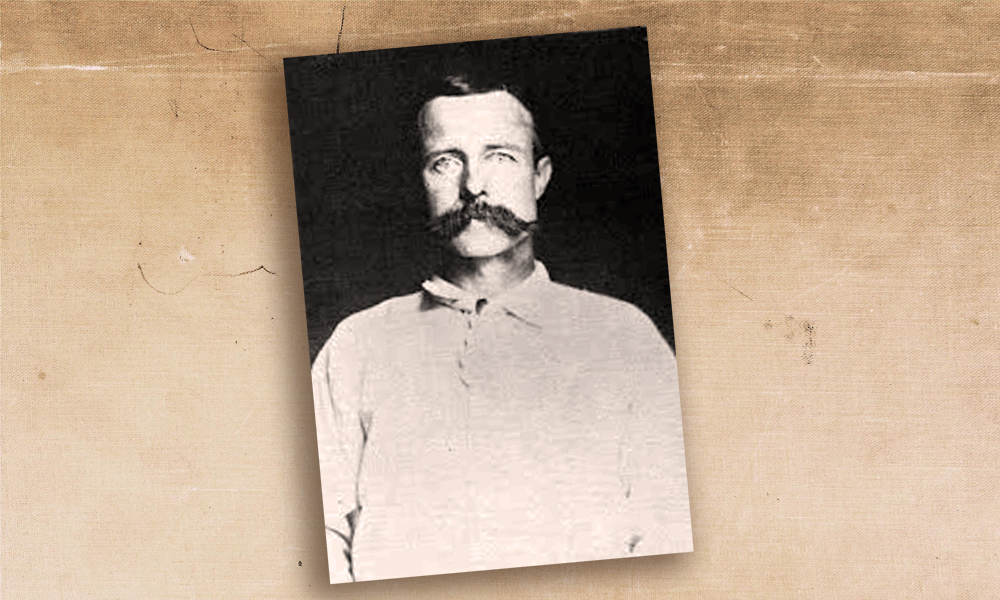
Scopes Monkey Trial begins
In Dayton, Tennessee, the so-called Scopes Monkey Trial begins with John Thomas Scopes, a young high school science teacher, accused of teaching evolution in violation of a Tennessee state law.
The law, which had been passed in March, made it a misdemeanor punishable by fine to “teach any theory that denies the story of the Divine Creation of man as taught in the Bible, and to teach instead that man has descended from a lower order of animals.” With local businessman George Rappleyea, Scopes had conspired to get charged with this violation, and after his arrest the pair enlisted the aid of the American Civil Liberties Union (ACLU) to organize a defense. Hearing of this coordinated attack on Christian fundamentalism, William Jennings Bryan, the three-time Democratic presidential candidate and a fundamentalist hero, volunteered to assist the prosecution. Soon after, the great attorney Clarence Darrow agreed to join the ACLU in the defense, and the stage was set for one of the most famous trials in U.S. history.
On July 10, the Monkey Trial got underway, and within a few days hordes of spectators and reporters had descended on Dayton as preachers set up revival tents along the city’s main street to keep the faithful stirred up. Inside the Rhea County Courthouse, the defense suffered early setbacks when Judge John Raulston ruled against their attempt to prove the law unconstitutional and then refused to end his practice of opening each day’s proceeding with prayer.
Outside, Dayton took on a carnival-like atmosphere as an exhibit featuring two chimpanzees and a supposed “missing link” opened in town, and vendors sold Bibles, toy monkeys, hot dogs, and lemonade. The missing link was in fact Jo Viens of Burlington, Vermont, a 51-year-old man who was of short stature and possessed a receding forehead and a protruding jaw. One of the chimpanzees–named Joe Mendi–wore a plaid suit, a brown fedora, and white spats, and entertained Dayton’s citizens by monkeying around on the courthouse lawn.
In the courtroom, Judge Raulston destroyed the defense’s strategy by ruling that expert scientific testimony on evolution was inadmissible–on the grounds that it was Scopes who was on trial, not the law he had violated. The next day, Raulston ordered the trial moved to the courthouse lawn, fearing that the weight of the crowd inside was in danger of collapsing the floor.
In front of several thousand spectators in the open air, Darrow changed his tactics and as his sole witness called Bryan in an attempt to discredit his literal interpretation of the Bible. In a searching examination, Bryan was subjected to severe ridicule and forced to make ignorant and contradictory statements to the amusement of the crowd. On July 21, in his closing speech, Darrow asked the jury to return a verdict of guilty in order that the case might be appealed. Under Tennessee law, Bryan was thereby denied the opportunity to deliver the closing speech he had been preparing for weeks. After eight minutes of deliberation, the jury returned with a guilty verdict, and Raulston ordered Scopes to pay a fine of $100, the minimum the law allowed. Although Bryan had won the case, he had been publicly humiliated and his fundamentalist beliefs had been disgraced. Five days later, on July 26, he lay down for a Sunday afternoon nap and never woke up.
In 1927, the Tennessee Supreme Court overturned the Monkey Trial verdict on a technicality but left the constitutional issues unresolved until 1968, when the U.S. Supreme Court overturned a similar Arkansas law on the grounds that it violated the First Amendment.

21ST CENTURY
2018
Last of Thai soccer team rescued from cave
In a search and rescue scramble that gripped the world’s attention for more than two weeks, the last of 12 Thai youth soccer players and their coach are safely rescued and transported to a local hospital on July 10, 2018.

1980S
1985
A bomb sinks the Rainbow Warrior, Greenpeace’s flagship vessel
In Auckland harbor in New Zealand, Greenpeace’s Rainbow Warrior sinks after French agents in diving gear plant a bomb on the hull of the vessel. One person, Dutch photographer Fernando Pereira, was killed.

WORLD WAR II
1943
Allies land on Sicily
On July 10, 1943, the Allies begin their invasion of Axis-controlled Europe with landings on the island of Sicily, off mainland Italy. Encountering little resistance from the demoralized Sicilian troops, the British 8th Army under Field Marshal Bernard Law Montgomery came ashore.

INVENTIONS & SCIENCE
1962
U.S. patent issued for three-point seatbelt
The United States Patent Office issues the Swedish engineer Nils Bohlin a patent for his three-point automobile safety belt “for use in vehicles, especially road vehicles” on July 10, 1962. Four years earlier, Sweden’s Volvo Car Corporation had hired Bohlin.

WORLD WAR II
1940
The Battle of Britain begins
On July 10, 1940, the Germans begin the first in a long series of bombing raids against Great Britain, as the Battle of Britain, which will last three and a half months, begins. After the occupation of France by Germany.

U.S. PRESIDENTS
1850
Millard Fillmore sworn in as 13th U.S. president
On July 10, 1850, Vice President Millard Fillmore is sworn in as the 13th president of the United States. President Zachary Taylor had died the day before, five days after falling ill with a severe intestinal ailment on the Fourth of July.

CRIME
1889
“Buckskin” Frank Leslie murders a prostitute
In a drunken rage, “Buckskin” Frank Leslie murders his lover, the Tombstone prostitute Blonde Mollie Williams. Leslie was an ill-tempered and violent man, especially when he drank. He told conflicting stories about his early life.

NATURAL DISASTERS & ENVIRONMENT
1887
Dam collapses in Switzerland, kills 70
On July 10, 1887, a dam breaks in Zug, Switzerland, killing 70 people in their homes and destroying a large section of the town. The dam at Zug was 80 feet high and made of concrete. When the dam was built, concrete-making and setting techniques were not as advanced as they are now.

CRIME
1992
The Exxon Valdez captain’s conviction is overturned
The Alaska court of appeals overturns the conviction of Joseph Hazelwood, the former captain of the oil tanker Exxon Valdez. Hazelwood, who was found guilty of negligence for his role in the massive oil spill in Prince William Sound in 1989.
TODAY IN NIGERIA HISTORY

1961 Senator Liyel Imoke was born at Ibadan.

1971 Nigeria became the 11th member of Organization of the Petroleum Exporting Countries (OPEC)

1981 Dr. Bala Mohammed, a leftist and political adviser to then Governor Abubakr Rimi of Kano state, murdered in Kano

2000 A leaking southern Nigerian petroleum pipeline explodes killing about 250 villagers scavenging gasoline
Comments
Post a Comment